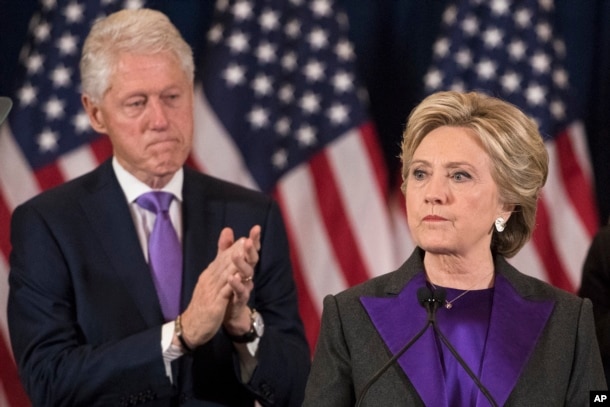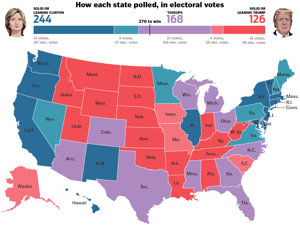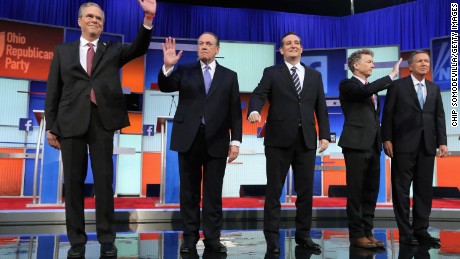From transcripts
Any candidate, having used a good talking point once, will likely repeat it. Talking points are a minor staple of political campaigns. The utterance may be fairly spontaneous the first time, but pretty soon it gets embedded in the basic stump speech. Then it gets repeated, and repeated, and repeated, with minor tweaks. Repetition is a characteristic of campaigns. Policy positions get repeated, catchphrases get repeated, jokes get repeated. More superficial observations also get repeated, as if they were good jokes or statements of position.
What many people seem to have forgotten is that Hillary Clinton used the assassination of Robert Kennedy as a repeated talking point in 2008. Since this is not a reminder conveyed in any of the large media outlets this year–catch Wolf Blitzer or Chris Matthews mentioning it–it is being brought up here. Amnesia is lethal to democracy.
Ironically, the question addressed was how long Clinton thought the campaign should continue in 2008, or more precisely, how long she thought she should stay in the race. Thus Hillary Clinton on March 6, 2008, to Time magazine:
[Q] “One group that probably ultimately wouldn’t want it to go on too long is the Democratic Party itself. Can you envision a point at which — if the race stays this close — and with the difficulties that everyone has analyzed in accumulating enough delegates to get any distance ahead where party elders would step in and say “Senators Clinton and Obama, this is now hurting the party and whoever will be the nominee in the fall. We need to figure this out.”
[A] “No I really can’t. I think people have short memories. Primary contests used to last a lot longer. We all remember the great tragedy of Bobby Kennedy being assassinated in June in L.A. My husband didn’t wrap up the nomination in 1992 until June, also in California. Having a primary contest go through June is nothing particularly unusual. We will see how it unfolds as we go forward over the next three to four months.”
For the record, I agree with then-Senator Clinton’s position that the Democratic primary race should continue.

New York, 2016
As a voter and citizen I feel that the primary race should continue through June this year, too.
However, bringing up June, 1992, is different from bringing up June, 1968. Coupling the two is one more manifestation of Hillary Clinton’s almost eerie tone-deafness. Somehow she seems to have trouble conceptually getting on top of the difference between the two races. (Her widely-published graduation speech in 1969, a year after RFK was shot and killed, did not mention the assassinations of 1968 any more than they mentioned the Vietnam War or civil rights.)
Bringing up assassination would have been remarkably poor judgment, from anyone on the campaign trail. Few to no presidential candidates in our nation’s history have volunteered comments on assassination as part of the course of events in politics. In 2008, Clinton’s doing so seemed uncomfortably pointed; she was talking about the insurgent candidacy of Robert F. Kennedy in 1968, and the insurgent candidacy in 2008 was Senator Barack Obama’s. Anyone who does not realize that Obama was the target of more threats than the norm, by the way, must have been living under the proverbial rock. See Petula Dvorak’s good column here, on the abuse and threats endured by the Obama family even in the White House. This is a difficult and dangerous topic even to touch in print.
Clinton’s remarks to Time in March 2008 were not some one-time slip, an exceptional lapse of some sort, attributable to the exhaustion of campaigning. More than two months later, Clinton was still comfortably repeating here same horse-race talking point.
To clarify: the reminder that Bill Clinton wrapped up the 1992 nomination in June was acceptable in itself. But in her horse-race comments, Hillary Clinton repeatedly linked the 1992 campaign with 1968.
Thus Hillary Clinton on May 7, 2008, in Shepherdstown, West Virginia:
“June of 1992, that’s when Bill really wrapped up the nomination, the middle of June after the California primary. You know, I remember very well what happened in the California primary in 1968 as, you know, Senator Kennedy won that primary.”
Hillary Clinton on May 7, 2008, in Washington, D.C.:
“Sometimes you gotta calm people down a little. But if you look at successful presidential campaigns, my husband did not get the nomination until June of 1992. I remember tragically when Senator Kennedy won California near the end of that nominating process.”
One could argue that Clinton was focused on Senator Kennedy’s having “won California near the end of that nominating process.” Mentioning his winning California rather his being shot there does clean the line up a bit.
If so, however, Clinton backslid again.
Here is Hillary Clinton on May 23, 2008, in Sioux Falls, Idaho:
“[from transcript]
CLINTON: People have been trying to push me out of this ever since Iowa.
UNIDENTIFIED MALE: Why?
CLINTON: I don`t know. I don`t know. I find it curious because it is — it is unprecedented in history. I don`t understand it. And you know between my opponent and his camp and some in the media, there has been this urgency to end this. And, you know, historically that makes no sense. So I find it a bit of a mystery.
UNIDENTIFIED MALE: So, you don`t buy the party unity argument?
CLINTON: I don`t because again, I`ve been around long enough. My husband did not wrap up the nomination in 1992 until he won the California primary somewhere in the middle of June, right?
We all remember Bobby Kennedy was assassinated in June in California. You know, I don`t understand it.”
The remarks provoked a storm of richly deserved criticism. Responses in the New York Daily News were typical:
“Hillary Clinton’s last-gasp campaign suffered a gaping, self-inflicted wound yesterday when she recalled Robert Kennedy’s 1968 assassination while defending her determination to keep running against Barack Obama.
“Meeting with the editorial board of the Argus Leader newspaper in Sioux Falls, S.D., Clinton vigorously defended soldiering on through the last two primaries on June 3.
“My husband did not wrap up the nomination in 1992 until he won the California primary somewhere in the middle of June, right?” Clinton said. “We all remember Bobby Kennedy was assassinated in June in California.”
Political reaction was swift and unanimously negative. Even Hillary loyalists expressed shock, dismay and private outrage.
It was a rare moment in political circles when Democrats and Republicans alike literally had the same visceral first response:
“Oh. My. God.”
“She said what?” an incredulous Rev. Al Sharpton told the Daily News, adding that the remark reinforced his belief that Clinton should fold her candidacy.
“The danger of her staying in is that she keeps making statements that do serious harm to the party and, increasingly, irreparable harm to her and her legacy,” Sharpton said.
A horrified senior Republican operative added, softly: “She is so finished. What a pathetically stupid thing to say.”
Ironically, one reason the comment aroused shock and dismay was that it seemed to come out of blue–out of left field–when actually, as quoted above, Clinton had repeatedly made the same observation before. It just had not been so widely quoted before.
Even the defense by Clinton supporter Robert Kennedy, Jr., makes the fact plain. Kennedy rushed to damage control, but his pro-Clinton statement explicitly noted that Clinton had said the same thing earlier:
“It is clear from the context that Hillary was invoking a familiar political circumstance to support her decision to stay in the race through June. I have heard her make this reference before, also citing her husband’s 1992 race, both of which were hard-fought through June,” he said in a statement.”
The remark was finally widely reported and noticed in late May of 2008. At that point Sen. Clinton had gotten so comfortable making the observation that she repeated it to a newspaper’s editorial board.
She then issued an apology of sorts:
“CLINTON: I regret, you know, that if my referencing that moment of trauma for our entire nation, and particularly for the Kennedy family, was in any way offensive. I certainly had no intention of that whatsoever.
My view is that we have to look to the past and to our leaders who have inspired us and give us a lot to live up to and I`m honored to hold Senator Kennedy`s seat in the United States Senate from the state of New York and have the highest regard for the entire Kennedy family. Thanks.”
Thanks. Again that eerie complacency, that hint of what-could-possibly-be-the-trouble, joined with a degree of self-exoneration more appropriate to having eaten someone else’s chocolate eclair by honest mistake.
Cleaning up these comments as much as possible, the general observation is that anything can happen in an election.
Election 2016
That being so, it is worth noting that Hillary Rodham Clinton’s allies in the Democratic National Committee and elsewhere have done everything they could to clear the field for Clinton in election 2016.
Why? If Armageddon awaits — cf. all the sinister Clinton references to Trump/Supreme Court/etc — then why would party insiders put all their eggs in one basket? If anything can happen in an election, why would they exclude every other candidate from Joe Biden to Jim Webb? Why did they do their best to prevent anyone else (a sitting Vice President, for example) from even getting into the race? How could that possibly be a good idea? Assuming for sake of argument that every individual super-delegate allied with Clinton honestly felt that Clinton was the best candidate, how could just one candidate possibly be a good idea? Isn’t betting everything on one candidate an act of lunatic risk-taking, in this context?
Another question, of course, is how a bunch of seasoned pols could honestly think the baggage-ridden Clinton was the best bet. Table that one for the moment. Inevitably, at some point, information about pressure points and unsavory if informal quid pro quos will seep out.
Meanwhile, party insiders and the neo-feminists–now more like Ladies Who Lunch–use the behind-the-scenes machinations as a reason to vote for Clinton. We’re the people who put you in the position of having to choose between Donald Trump and Hillary Clinton. Vote for Us!
It used to be called “protection,” as in ‘the protection racket’. Do what we want, so bad things won’t happen to you.
Back to 2008
Having failed to hold Clinton to account for her public musings on assassination in 2008, some large media outlets and, incomprehensibly, some members of Congress then tried to boost Hillary Clinton’s nomination as Vice President.
To put that suggestion in context, let’s recap a few devastating items. First, Hillary Clinton is the only candidate for president in U.S. history openly to reference political assassination on the campaign trail. Second, she did so NOT once or twice, but repeatedly, at least four times on the record, referring specifically to the murder of Robert Kennedy in June, 1968, each time, although not always with the explicit term “assassination.” Third, she started this unsavory line of thought on the campaign trail (so far as is known) after failing to clench the nomination on February 5—after she had said on air, “It’ll all be over Feb. 5.”
Last, the bizarre referencing of assassination was a talking point. The focus was not Robert Kennedy; it was Clinton’s campaign. In Clinton’s bizarrely complacent style, the allusion to Kennedy’s death in a presidential campaign was a box to check in the list of campaign things-to-say, to make her running credible.
As I wrote in 2008, that kind of recklessness jeopardizes public elections, jeopardizes life and limb of prominent candidates. But the possible destructiveness of the comments was subordinate.
Conservative commentator George F. Will tried to write off the justifiable reaction to the assassination references as “synthetic outrage.” But then Will, like the rest of the GOP noise machine, was eager for Clinton to be the Democratic nominee in 2008. The GOP is even more eager for her to be the nominee this time.
Even given the shameless sacrifice of national interest to narrow partisanship, it is still amazing that well-placed figures in media and members of Congress tried in 2008 to push as VP a woman who repeatedly referenced assassination.
The only reason that 2008 trend seems less unbelievable in hindsight is that some of the same people are now trying to push her as POTUS.













